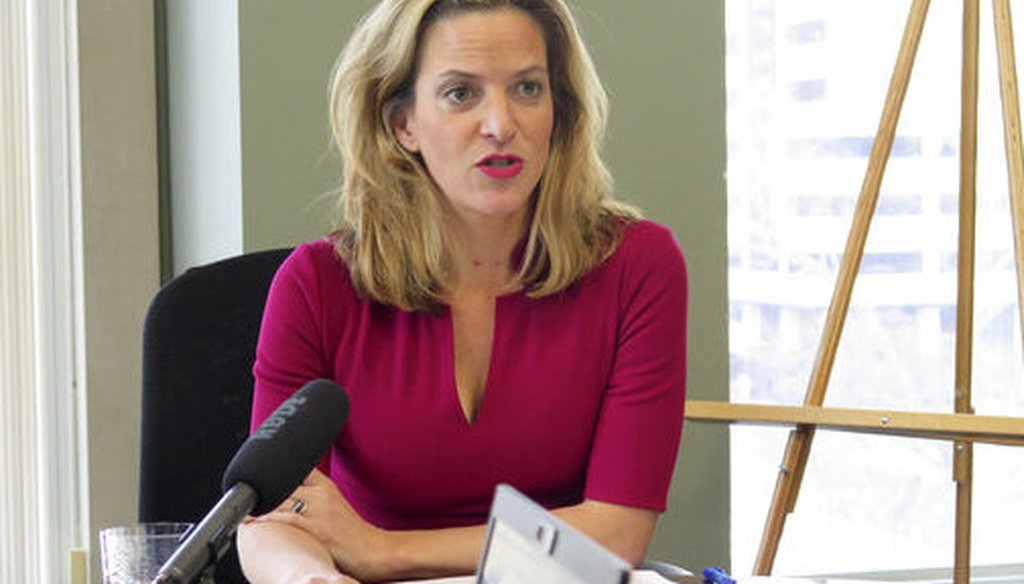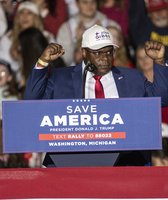Get PolitiFact in your inbox.

Michigan Secretary of State Jocelyn Benson. (AP)
If Your Time is short
- Michigan's Secretary of State mailed absentee ballot applications to voters. A court case will determine whether she had the legal authority to do so.
- Plaintiffs argue Michigan election law prohibits the Secretary of State from mailing unsolicited absentee ballot applications while the Secretary of State's attorneys argue she has greater authority than local election officials.
- In 2018, Michigan's constitution was amended to give voters the right to vote absentee for any reason.
Michigan Secretary of State Jocelyn Benson announced in May that all registered voters in the state would receive an application to vote absentee in the August primary and November general elections. Shortly after that, three court cases were filed in the Michigan Court of Claims declaring Benson’s action illegal.
Judge Cynthia Diane Stephens recently denied the plaintiffs’ motion for a preliminary injunction. The case is not closed, but the judge indicated the plaintiffs were unlikely to succeed on the merits. The legal question is whether Benson had the authority to mail out the absentee ballot applications.
Until recently, voters in Michigan could only request an absentee ballot under limited circumstances. But in 2018, voters overwhelmingly supported Proposal 3, which enshrined a constitutional right to vote absentee for any reason.
In a few weeks, many Michigan voters will vote absentee in the state’s August primary. And soon after, the November general election will provide all Michigan voters their first opportunity to vote absentee in a presidential election. Both elections come at a time when the coronavirus has raised issues around the public health risks of voting in person, and President Donald Trump has criticized vote-by-mail efforts as enabling voter fraud.
The argument that Benson acted illegally
Three plaintiffs filed separate cases against Benson. Two of the plaintiffs — Nevin P. Cooper-Keel and Yvonne Black — are Republican candidates vying for seats in the state Legislature. The third plaintiff is Robert Davis who has filed more than 100 lawsuits and is considered a community gadfly by some. In his complaint, Davis calls himself "a strong and loyal Democrat."
Cooper-Keel worries Benson’s action hurts his election chances. "One protection candidates have that it will be a fair election is that the entrenched swamp can’t use the government to solicit voters who have not availed themselves to such solicitation," Cooper-Keel wrote in his complaint.
Davis, meanwhile, fears his local election clerk will not accept the absentee ballot application issued by the Secretary of State. He also worries that if Benson illegally sent unsolicited absentee ballot applications, candidates will challenge the legality of the election results.
Michigan election law stipulates that the clerk of a city or township must make absentee ballot applications available to any voter who requests one. Since the law makes no mention of the Secretary of State’s authority, the plaintiffs argue that the law prohibits the Secretary of State from providing voters absentee ballot applications.
The plaintiffs also claim that case law deems the Secretary of State’s action illegal because she mailed absentee ballot applications to voters who did not request them. In one case, the Michigan Court of Appeals ruled in 2007 that city clerks are not permitted to mail absentee ballot applications to voters who did not request them. In another case, the court wrote in its unpublished opinion in 2008 that a county clerk acted illegally when she mailed unsolicited absentee ballot applications. If local election officials do not have the authority to send absentee ballot applications to voters who did not request them, neither does the Secretary of State, the plaintiffs argue.
While both cases were decided before Proposal 3’s passage, Black argues that just because Michigan voters now have the right to vote absentee for any reason, the process for applying for an absentee ballot has not changed.
The argument that Benson acted legally
In defending the Secretary of State’s action, attorney Erik Grill noted that even though the law governing the absentee ballot application process only references the authority of local election officials, that does not mean that Benson violated state election law.
The Secretary of State possesses greater authority under Michigan election law than local election officials, Benson’s defense team argues. In her initial conclusion, Stephens wrote, "There is some support for the notion that [Benson] possesses superior authority as compared to local election officials."
Grill also pushed back against the claim that the establishment of a new constitutional right to vote absentee did not change the absentee ballot application process. "Every registered voter now has a constitutional right to vote absentee without having to provide any reason. That changes the landscape of the election process, I think, rather significantly," Grill said. The Michigan Constitution says that the right to vote absentee for any reason "shall be liberally construed in favor of voters’ rights in order to effectuate its purposes."
Stephens indicated some support for Grill’s position that Proposal 3 changed the absentee voting process in Michigan, writing that Michigan’s election law as well as the two court cases cited by the plaintiffs "do not account for the change to this state’s constitution."
What the experts say
Samuel Bagenstos, a law professor at the University of Michigan, offers three arguments in support of Benson’s authority to mail unsolicited absentee ballot applications. First, the court cases cited by the plaintiffs only address the authority of local clerks and not the Secretary of State, Bagenstos notes. Second, he suggests that the plaintiffs’ reading of Michigan election law is too narrow. While Michigan election law says local clerks must furnish voters with absentee ballot applications upon request, "it doesn’t necessarily imply that a person can’t get an application otherwise," Bagenstos said.
Finally, when Michigan’s constitution was amended in 2018 to establish no-excuse absentee voting, it included "a provision that expressly says it should be read broadly to protect the right to vote," observes Bagenstos.
"Even under Michigan law prior to Proposal 3, the secretary had pre-existing, broad authority over absentee voting," says Eliza Sweren-Becker, counsel in the Democracy Program at the nonpartisan Brennan Center for Justice, which filed an amicus brief in support of the Secretary of State.
Proposal 3 "only enlarges the authority of the Secretary of State to ensure that every Michigan voter has access to that new constitutional right," Sweren-Becker said.
The court will soon issue its final determination on whether Benson acted within her authority when she mailed unsolicited absentee ballot applications to registered voters.
It is unlikely the court’s decision will affect voters who have already received and submitted absentee ballot applications mailed from Benson’s office. "I find it hard to believe that local election officials would have the authority to reject an absentee ballot application just because that application was sent to them by someone who lacked the authority to do so," Rick Hasen, a law professor at the University of California at Irvine and a national expert in election law, said.
Hasen also notes it is improbable the court’s decision will open the door to any legal challenges to election results. "I can’t foresee a situation where a court would throw out the results of an election simply because someone who didn’t have the authority reached out and gave people the ability to vote by mail," Hasen said.
Michigan voters had their first opportunity in a statewide election to exercise their new constitutional right during the presidential primary held on March 10 when 877,488 absentee votes — 38% of the total — were cast. It also marked the same day the state reported its first COVID-19 cases. More than 70,000 cases later, voters are embracing absentee voting ahead of the upcoming elections. So far, more than 1.67 million absentee ballots have been issued to Michigan voters.
During local elections in Michigan held in May, 98% of votes were cast by mail and twice as many voters participated in the elections compared to what is typical in Michigan local contests, according to Benson.
Our Sources
Michigan Secretary of State, Benson: All voters receiving applications to vote by mail, 5/19/20
Michigan Court of Claims, Davis v Benson complaint
Michigan Court of Claims, Cooper-Keel v Benson complaint
Michigan Court of Claims, Black v Benson complaint
Michigan Court of Claims, Opinion and Order Denying Preliminary Injunction
House Fiscal Agency, Legislative Analysis of Voter Registration and Absentee Voting
Secretary of State, 2018 Michigan Election Results, 11/6/18
The Detroit Free Press, A felon's crusade: Robert Davis vs. everybody, 8/11/17
Michigan Election Law, Act 116, Section 168.759
Michigan Court of Appeals, Taylor v Currie
Michigan Court of Appeals, Fleming v Macomb Co Clerk
Michigan Court of Claims, Hearing on Motions Requesting Immediate Declaratory Judgment and Preliminary Injunction, 6/16/20
Michigan State Constitution, Article II § 4
Michigan Court of Claims, Brennan Center for Justice Amicus Curiae Brief in Support of the Secretary of State
The Detroit Free Press, Michigan coronavirus cases: Tracking the pandemic
The Detroit Free Press, Michigan absentee ballot requests skyrocket compared to 2016, 7/14/20
WDET, Michigan Secretary of State Jocelyn Benson on Absentee Voting Amidst a Pandemic, 5/6/20
Richard L. Hasen, Chancellor's Professor of Law and Political Science at the University of California, Irvine, phone interview, 7/1/20
Samuel Begenstos, Frank G. Millard Professor of Law at the University of Michigan, phone interview, 7/14/20
Eliza Sweren-Becker, counsel in the Democracy Program at the Brennan Center for Justice, phone interview, 7/8/20














































